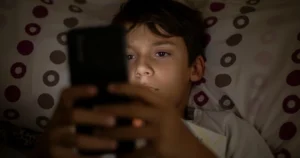Our experts, Dr Elizabeth Milovidov and Lauren Seager-Smith, discuss how influencers might affect pre-teens online and what parents can do to support them.
Why do children follow influencers?
Social media influencers can bring excitement and inspiration into the lives of tweens and preteens as they share their experiences online with well-designed settings, scripts, and oftentimes spontaneity. Influencers, like celebrities, can have either a negative or positive influence on their young audiences, and it is crucial that children and young people are able to think critically about what they are viewing.
How can influencers impact a child or young person?
As psychologist Dr. Linda Papadopoulos advises, there are potential negative effects that influencers can have on a child’s self-esteem, body image and understanding of ‘real life’. As with negative influences in real life (such as young children smoking or engaging in inappropriate behaviour), parents and carers can counter those influences by having open and transparent conversations with their children.
There are many factors that impact behaviour, and these are different for every child. As parents and carers, we know our child, their interests, strengths and vulnerabilities, and should question how big a role influencers play in their life.
If we look at the popular child influencers, we can get a sense of what draws many children in – the ‘beautiful’, the musical and sporty, the pranksters and the gamers.
Influencers tend to use their channels to highlight endorsements or sponsorship deals which means that children may be encouraged to purchase items that they are promoting from a range of brands.
Whether it’s toys, make-up, games or clothing, it’s important to have a conversation with children who may be swayed or under pressure to think that these recommendations are no different than watching an ad on TV. So, it’s best to do your own research before buying them.
How can parents limit negative impacts?
Having conversations that improve critical thinking and digital literacy about what children experience online is one of the best ways to support them in the digital environment.
Ideal conversation starters for parents and carers include:
- Do you understand that what you are seeing online is not always true?
- Does the influencer make money if they have more views, more likes or more clicks?
- Does the influencer’s lifestyle reflect real life?
- How much time do you think the influencer spent to make that video?
- What is the purpose of the video? Why are they talking about this subject?
- How do you feel when you watch the influencer (anxious, fear of missing out, inspired, etc.)?
- How can you choose influencers to watch who make you feel positive?
Find out what people your child likes, what messages they are reinforcing, whether they make them feel positive and inspired, or whether they make them feel like they’re not good enough. Be conscious of the role of influencers in marketing certain products and lifestyles.
For my children, the pull is online gamers, and this influences what they want and how they spend their time. We must be vigilant and make sure that as much as it is in our power, we are guiding our children towards the positive, wherever it may be found.
Many kids have being an influencer a the top of their list of professions they want to be. All they need is a social media account. And although most social media platforms have an age limit of 13+, YouTube has been the go-to place for those under this age.
It is normal for kids to look up to a popular influencer or idol of theirs. However, it is always essential to keep an eye on who they watch, the content they watch and how often.
If your child watches an influencer:
- Are the influencers age-appropriate? Get to know which influencers your children are watching. You can simply watch a few of their videos, check out their social media and perform a google search to see who they are. Common Sense Media provide YouTube channel reviews that will give you a quick view of what you need to look out for
- Set ground rules to help them choose appropriate content to watch. You can use our family agreement to get you started
- Make use of parental control features to help reduce associated online risks. See our parental control how-to guides
- Consider setting up a family account, such as Google Family Link
- Use child-friendly apps and platforms, such as YouTube Kids
- For younger children, create playlists of age-appropriate videos that they’ll enjoy based on their interests
- Encourage them to think critically about what they see online. While they may believe everything that their favourite influencer is saying is true, it’s important to encourage them to check the information out with other sources and help them differentiate between what is fact and opinion. See our Online Critical Thinking guide for more tips.
- If your child aspires to be an influencer, there are a few things to think about: What is an appropriate age to start? What platforms should be used? How you can keep them safe? Our expert Dr. Tamasine Preece provides all the tips you need to think about in this article: My child wants to be a vlogger. Is it safe?








